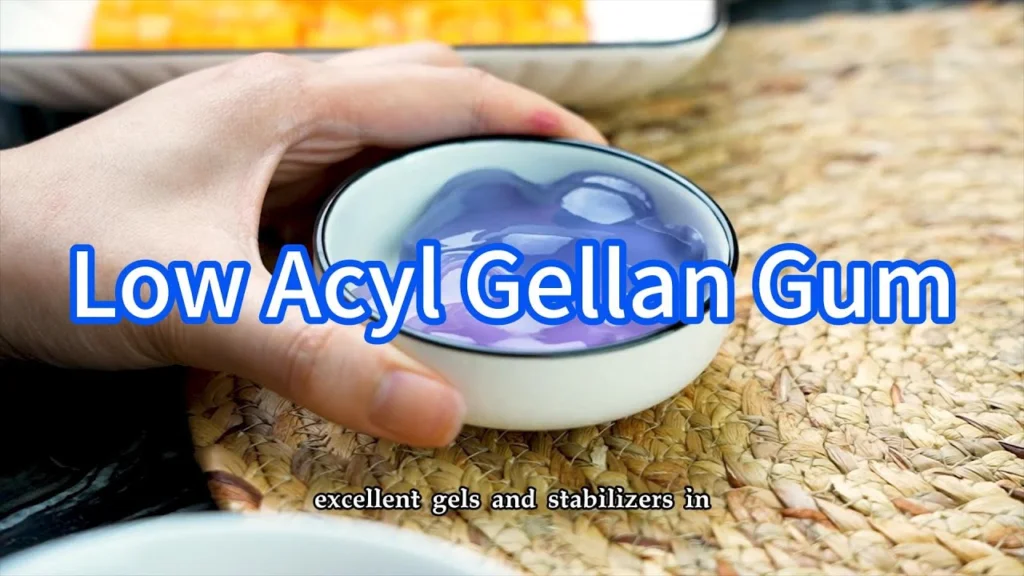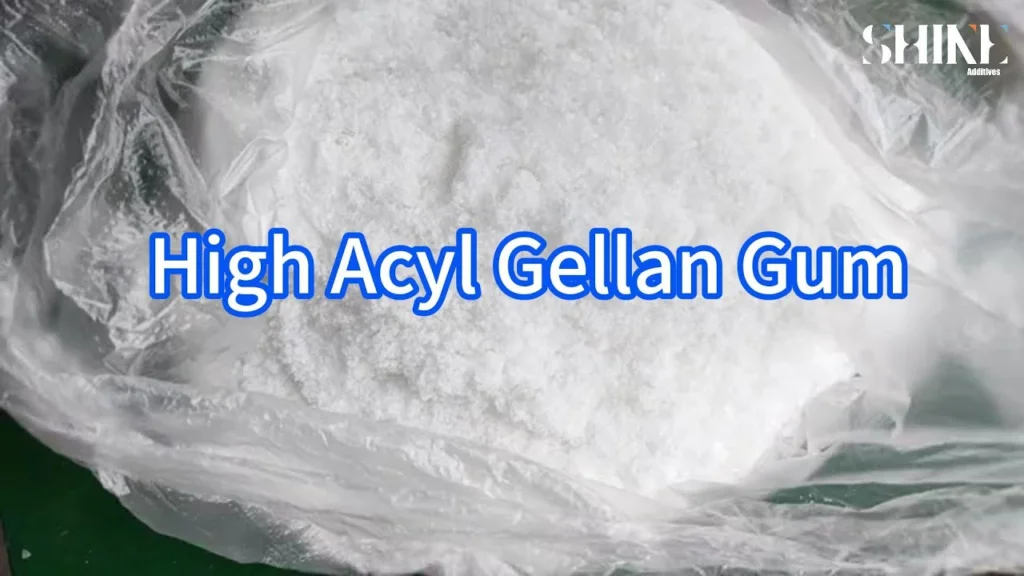In the world of food additives and gelling agents, gellan gum stands out as a versatile and widely used ingredient. But not all gellan gums are created equal. Shine, a leading name among gellan gum manufacturers, offers both low acyl and high acyl gellan gum. Each type has its unique properties and applications, making the choice between them more than just a matter of preference. This article delves into the differences between low acyl and high acyl gellan gum, exploring their characteristics, uses, and how to choose the right one for your needs.

Low acyl gellan gum, known for its firm and brittle gel texture, is a favorite among food technologists and gellan gum suppliers for applications requiring precise structural integrity. This type of gellan gum is ideal for products where a clear, stable gel is essential, such as jellies and structured desserts. Its ability to maintain stability and texture under a wide range of temperatures and pH levels makes it an invaluable ingredient in the food industry.

On the other hand, high acyl gellan gum is celebrated for its ability to produce soft, elastic gels. This property makes it particularly suitable for applications where a flexible and resilient texture is desired. Dairy products, plant-based milks, and certain desserts benefit greatly from the unique texture that high acyl gellan gum provides. Its versatility and ease of use have made it a staple ingredient for innovative food developers looking to push the boundaries of texture and mouthfeel.
When comparing low acyl versus high acyl gellan gum, it’s crucial to consider factors such as gel strength, clarity, and versatility. Low acyl gellan gum offers superior gel strength and clarity, making it the go-to choice for applications requiring precision and visual appeal. High acyl gellan gum, with its softer and more elastic gel, provides a unique texture that can enhance the sensory experience of a wide range of products.
From a health and safety perspective, both low acyl and high acyl gellan gum have been extensively evaluated and deemed safe for consumption by regulatory authorities worldwide. However, choosing the right type of gellan gum for your application goes beyond just safety considerations. It requires an understanding of the functional differences between the two and how they can impact the final product.
Shine, as one of the premier gellan gum manufacturers and suppliers, is committed to providing high-quality gellan gum solutions tailored to the specific needs of our customers. Whether you’re looking for the firm, brittle texture of low acyl gellan gum or the soft, elastic properties of high acyl gellan gum, Shine has the expertise and product range to help you achieve your formulation goals.
In conclusion, the choice between low acyl and high acyl gellan gum depends on the specific requirements of your application, personal preferences, and health considerations. Understanding the unique properties and applications of each can help you make an informed decision, ensuring the success of your product in the competitive market. As always, partnering with a reputable gellan gum supplier like Shine can provide the support and quality ingredients you need to bring your innovative ideas to life.
Understanding Gellan Gum
Gellan Gum, a hydrocolloid produced by the bacterium Sphingomonas elodea, has emerged as a shining star in the food industry, thanks to its versatility and superior gelling qualities. Used not just in food but also in pharmaceuticals and cosmetics, this biopolymer has been a game-changer for manufacturers looking for reliable and effective stabilizing agents. Shine, as a leading name among Gellan Gum manufacturers, prides itself on offering both Low Acyl Gellan Gum and High Acyl Gellan Gum, catering to a wide array of industry needs.
At its core, Gellan Gum’s appeal lies in its ability to create gels of varying textures and strengths, making it an indispensable ingredient in the formulation of innovative products. Whether it’s the firm and brittle gels desired in confectionery and jellies, achieved through Low Acyl Gellan Gum, or the soft and elastic consistency sought after in desserts and dairy products, courtesy of High Acyl Gellan Gum, Shine ensures that Gellan Gum suppliers and end-users have access to high-quality ingredients. The distinction between the low acyl and high acyl variants lies not just in their physical properties but also in their ability to interact with other substances, thus opening up a plethora of application possibilities.

Understanding the chemistry and functionality of Gellan Gum is crucial for anyone looking to incorporate it into their products. Its ability to form gels in the presence of ions makes it a valuable tool for creating textures that can withstand various processing conditions, such as sterilization and pasteurization, without compromising on quality. This has made Gellan Gum a preferred choice among Gellan Gum suppliers and users alike, who rely on the consistency and predictability it offers.
Moreover, the commitment of Gellan Gum manufacturers like Shine to quality and innovation has played a significant role in the widespread adoption of this ingredient. By continuously refining their processes and adhering to stringent safety standards, these manufacturers ensure that the Gellan Gum available in the market is not only effective but also safe for consumption. This dedication to excellence is what sets Shine apart in the competitive landscape of Gellan Gum suppliers and manufacturers.
In conclusion, the world of Gellan Gum is a fascinating one, filled with scientific intrigue and boundless potential for application. Whether it’s the low acyl or high acyl variant, the role of Gellan Gum in modern food science cannot be overstated. As the industry continues to evolve, the expertise of manufacturers and suppliers like Shine will be invaluable in harnessing the full potential of this remarkable ingredient.
Low Acyl Gellan Gum: Characteristics and Uses
When it comes to the world of gelling agents, Shine‘s Low Acyl Gellan Gum stands out for its unique properties and versatility. This form of gellan gum, produced by leading gellan gum manufacturers, is renowned for creating firm, brittle gels. Unlike its counterpart, High Acyl Gellan Gum, which forms soft, elastic gels, Low Acyl Gellan Gum is the go-to choice for applications demanding precise structural integrity and stability. This distinction makes it especially valuable in the culinary, pharmaceutical, and cosmetic industries.

The magic behind Low Acyl Gellan Gum lies in its low acyl content. This characteristic is what gives the gel its firm and brittle texture. When dissolved in water, it forms a gel that is clear and robust, making it an ideal ingredient for chefs and food manufacturers aiming to create innovative dishes and products. Its ability to withstand high temperatures and retain its gel strength under various conditions adds to its appeal, offering a reliable solution for products that undergo thermal processing.
Among the many applications of Low Acyl Gellan Gum, some of the most notable include:
- Jellies and jams that require a clear, firm structure.
- Structural components in molecular gastronomy, where precision and shape retention are key.
- Plant-based milk alternatives, where it helps in stabilizing the beverage, preventing separation.
- Capsules and tablets in the pharmaceutical industry, providing a vegan and stable base for medications.
Choosing between Low Acyl and High Acyl Gellan Gum often comes down to the specific needs of the product. For those in search of clarity, firmness, and stability, Low Acyl Gellan Gum, offered by top gellan gum suppliers and manufacturers, is the unmatched choice. Its ability to create a unique texture and maintain consistency across various temperatures and conditions makes it a favored ingredient among professionals.
However, the decision doesn’t rest on functionality alone. Health and safety considerations are paramount, and it’s reassuring to know that both Low Acyl and High Acyl Gellan Gum are recognized for their safety. Approved by regulatory bodies worldwide, they are considered safe for consumption, which is a testament to the rigorous standards upheld by gellan gum manufacturers and suppliers, including Shine.
In conclusion, Low Acyl Gellan Gum’s role in the food, pharmaceutical, and cosmetic industries cannot be overstated. Its firm, brittle gel texture, coupled with its ability to maintain stability under a variety of conditions, makes it a valuable tool for professionals looking to push the boundaries of their creations. As the demand for innovative and high-quality products continues to grow, the expertise of gellan gum manufacturers and suppliers in producing and distributing Low Acyl Gellan Gum will remain indispensable.
High Acyl Gellan Gum: Characteristics and Uses
When it comes to the world of gelling agents, Shine stands out as a beacon of quality and innovation, especially within the realms of High Acyl Gellan Gum. This variant of gellan gum, unlike its Low Acyl counterpart, is celebrated for its unique ability to produce soft, elastic gels. Such a property makes it an invaluable asset in the food industry, particularly for those looking to achieve a specific texture in desserts and dairy products. But what exactly sets High Acyl Gellan Gum apart, and why is it the go-to choice for certain applications?

Firstly, the magic of High Acyl Gellan Gum lies in its acyl content. This higher acyl content is what gives the gum its soft and elastic nature, allowing for a versatile range of textures from tender and delicate to springy and resilient. This flexibility in textural outcomes is a boon for product developers and chefs alike, offering an unparalleled tool in the creation of innovative food items. Gellan Gum Manufacturers and Gellan Gum suppliers, including Shine, have recognized this demand, ensuring that High Acyl Gellan Gum is readily available for a variety of applications.
From a practical standpoint, the uses of High Acyl Gellan Gum are vast. In the realm of dairy products, it’s utilized to enhance the mouthfeel of yogurts, to stabilize cream fillings in pastries, and to maintain the uniformity of flavored milks. Desserts, too, benefit from its application, with everything from soft jellies to structured yet tender gummy candies being within reach. Beyond the food industry, this form of gellan gum finds its place in cosmetics and pharmaceuticals, where gentle, smooth textures are often desired.
Comparatively, when looking at Low Acyl Gellan Gum, the stark difference in gel texture is evident. Low Acyl variants create firm, brittle gels which, while useful in their own right, do not offer the same tactile experience as High Acyl Gellan Gum. This distinction is crucial for manufacturers and creators in deciding which form of gellan gum best suits their project’s needs. Understanding the characteristics of both types allows for more informed choices, ultimately leading to higher quality end products.
In conclusion, High Acyl Gellan Gum’s role in the food, pharmaceutical, and cosmetic industries cannot be understated. Its ability to produce soft, elastic gels makes it a preferred choice for a wide array of applications. As Gellan Gum Manufacturers and Gellan Gum suppliers continue to innovate and supply high-quality products, brands like Shine are at the forefront, ensuring that consumers and professionals alike have access to the best possible ingredients. The versatility and unique properties of High Acyl Gellan Gum indeed make it a standout ingredient in the vast world of gelling agents.
Comparative Analysis: Low Acyl vs. High Acyl
When delving into the world of gelling agents, the distinction between Low Acyl Gellan Gum and High Acyl Gellan Gum becomes paramount, especially for enthusiasts and professionals aiming to harness the unique properties of these substances. Shine, a leading brand in the industry, has been at the forefront of providing high-quality gellan gum, thanks to its network of reliable Gellan Gum Manufacturers and Gellan Gum suppliers. This comparative analysis aims to shed light on the fundamental differences and applications of low acyl and high acyl gellan gum, guiding consumers and producers in making informed decisions.
Low Acyl Gellan Gum is celebrated for its ability to form firm, brittle gels. This characteristic makes it an ideal choice for applications that require precise structural integrity and stability, such as in jellies and structured desserts. The gel’s clarity is another notable feature, offering aesthetically pleasing options for culinary applications. On the other hand, High Acyl Gellan Gum is known for producing soft, elastic gels, which are preferred in applications where a more flexible and resilient texture is desired. This includes a variety of desserts, dairy products, and even some beverages where mouthfeel plays a crucial role in the consumer’s experience.

The choice between low acyl and high acyl gellan gum often boils down to the specific requirements of the application. For instance, the clarity of the gel might be a critical factor in certain culinary presentations, making low acyl the preferred option. Conversely, when a softer, more elastic texture is desired, high acyl takes the lead. It’s important to note that both types of gellan gum, supplied by Shine’s network of Gellan Gum Manufacturers and Gellan Gum suppliers, are capable of being used in a wide range of pH levels and in conjunction with other ingredients, which enhances their versatility in food production and beyond.
Moreover, the comparative analysis of low acyl versus high acyl gellan gum extends beyond texture and application. It also encompasses aspects such as gel strength, where low acyl gellan gum typically exhibits higher gel strength, making it suitable for applications requiring substantial structural support. High acyl gellan gum, with its lower gel strength, excels in scenarios where a delicate, tender texture is paramount.
In conclusion, the choice between low acyl and high acyl gellan gum is not about which is better in a general sense but rather which is more suited to a specific application. Shine, through its reputable Gellan Gum Manufacturers and Gellan Gum suppliers, ensures that both variants are produced with the highest quality standards, offering versatility and efficiency for various industrial applications. Whether you’re leaning towards the firmness and clarity of low acyl gellan gum or the softness and elasticity of high acyl gellan gum, understanding their distinct properties will empower you to make the right choice for your needs.
Health and Safety Considerations
When it comes to the use of gellan gum, whether it be low acyl or high acyl, health and safety considerations are paramount. Consumers and producers alike have shown increasing interest in the health implications and safety profiles of food additives. Shine, a leading name among gellan gum manufacturers, emphasizes the importance of understanding these aspects to make informed choices. Both low acyl gellan gum and high acyl gellan gum have been extensively studied to ensure their safety for consumption.
Regulatory bodies worldwide, including the FDA in the United States and EFSA in Europe, have evaluated the safety of gellan gum. These organizations have deemed it safe for use in food products within specified limits. However, it’s crucial for consumers to be aware of the source of their gellan gum. Gellan gum suppliers and manufacturers like Shine adhere to strict quality control and safety standards to ensure their products meet these regulatory requirements.
Despite its safety profile, some individuals may experience digestive discomfort when consuming products containing gellan gum, especially if consumed in large amounts. This is relatively rare and generally considered to be a mild side effect. The versatility of gellan gum, whether low acyl for its firm, brittle texture, or high acyl for its soft, elastic qualities, means it can be found in a wide range of products. Therefore, understanding one’s tolerance can help in making dietary choices that align with personal health considerations.
Moreover, the environmental impact and sustainability practices of gellan gum production are also under scrutiny. Forward-thinking companies like Shine are committed to sustainable practices in sourcing and producing gellan gum. This includes ensuring that their gellan gum, whether sourced for high acyl or low acyl applications, is produced in an environmentally friendly manner. Consumers increasingly value this transparency and commitment to sustainability from their gellan gum suppliers and manufacturers.
In conclusion, when considering the health and safety aspects of low acyl and high acyl gellan gum, it’s essential to look at the regulatory status, potential for digestive discomfort, and the environmental impact of production. Shine, along with other responsible gellan gum manufacturers and suppliers, plays a crucial role in providing safe, high-quality gellan gum for various applications. By staying informed about these considerations, consumers can make choices that align with their health needs and environmental values.
Choosing the Right Gellan Gum for Your Needs
When it comes to selecting the perfect gellan gum for your culinary creations or industrial applications, the choice between low acyl and high acyl variants is crucial. Each type offers unique properties that can significantly affect the texture, stability, and appearance of your product. Whether you’re a professional chef, a home cooking enthusiast, or an industry expert, understanding the differences between these two forms of gellan gum will empower you to make informed decisions. Shine, as a leading name in the realm of gellan gum manufacturers and suppliers, is dedicated to providing high-quality ingredients tailored to your specific needs.

Low Acyl Gellan Gum is renowned for its ability to create firm, brittle gels. This makes it an excellent choice for applications that require precise structural integrity, such as structured desserts, vegan cheese, and certain types of confectionery. On the other hand, High Acyl Gellan Gum is celebrated for its capacity to produce soft, elastic gels, perfect for applications desiring a more flexible and resilient texture like puddings, dairy products, and some beverages.
But how do you decide which gellan gum is the right fit for your project? The answer lies in understanding the specific requirements of your application and how the properties of each gellan gum type align with those needs. For applications that demand clarity and a strong gel structure, Low Acyl Gellan Gum is often the preferred choice. Its ability to form clear, strong gels at low concentrations makes it a cost-effective and efficient option. In contrast, High Acyl Gellan Gum is your go-to for products that benefit from a smoother, more elastic texture and a higher tolerance to heat and acids.
Shine, as a trusted name among gellan gum suppliers, recommends considering the following factors when choosing between low acyl and high acyl gellan gum:
- Texture and Firmness: Decide whether your application requires a firm, brittle gel or a soft, elastic texture.
- Clarity: Consider whether a clear or opaque gel aligns better with your product’s aesthetic requirements.
- Stability: Evaluate the environmental conditions (e.g., temperature, pH) your product will be exposed to and choose a gellan gum that offers the best stability under those conditions.
- Regulatory Compliance: Ensure that the gellan gum variant you select meets the regulatory requirements of your product’s market.
Ultimately, the choice between Low Acyl and High Acyl Gellan Gum depends on a nuanced understanding of your product’s requirements and the unique benefits each type of gellan gum offers. By partnering with Shine, you gain access to a wealth of expertise and high-quality gellan gum options that can elevate your products. Whether you’re formulating a new beverage, designing a novel dessert, or innovating in the pharmaceutical field, Shine’s range of Low Acyl and High Acyl Gellan Gum products are designed to meet your needs and exceed your expectations.
Frequently Asked Questions
- What exactly is gellan gum?Gellan gum is a powerhouse gelling agent that’s become a go-to for anyone looking to add a bit of structure and texture to their culinary creations. Think of it as the secret ingredient that keeps your desserts standing tall and your sauces just the right kind of smooth. It’s not just a one-trick pony, though; this versatile ingredient finds its way into pharmaceuticals and cosmetics, proving its worth far beyond the kitchen.
- How do low acyl and high acyl gellan gum differ?Imagine you’re at a party and you’ve got two types of jelly: one’s firm and holds its shape like a disciplined soldier (that’s your low acyl gellan gum), and the other’s wobbling around, full of bounce and life (hello, high acyl gellan gum). Low acyl is all about giving you that perfect, unyielding structure, while high acyl is the go-to for when you want a softer, more elastic texture. It’s like choosing between a crunchy biscuit and a soft, chewy cookie – both are amazing, but it’s all about what you’re in the mood for.
- Which type of gellan gum should I use in my food products?The million-dollar question, isn’t it? Well, it boils down to what you’re trying to achieve. If you’re crafting something that needs to stand firm and have a precise shape, like a vegan cheese or a jello art masterpiece, low acyl is your best friend. On the flip side, if you’re after that irresistibly soft and bouncy texture in your desserts or dairy alternatives, high acyl will make your culinary dreams come true. It’s all about matching the gellan gum to your vision.
- Are there any health considerations I should be aware of?Let’s talk health, shall we? Both low and high acyl gellan gum have been given the green light by food safety authorities, which means they’re safe to use in your food products. However, as with any ingredient, moderation is key. It’s always a good idea to keep an eye on how much you’re using, ensuring your creations are not just delicious but also balanced and healthy. Think of it as adding a sprinkle of magic – a little goes a long way.
- Can I use gellan gum in homemade recipes?Absolutely! Unleash your inner chef and experiment with gellan gum in your home kitchen. Whether you’re aiming to impress with a fancy dessert or simply want to add a professional touch to your sauces and soups, gellan gum can be your secret weapon. Just remember, the type of gellan gum you choose (low acyl or high acyl) will affect the texture of your final masterpiece, so choose wisely based on the surprise and explosion of texture you’re aiming for.
